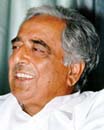The Rediff Special/B K Nehru
Congress leaders wanted Farooq to be dismissed and replaced
by a Congress nominee
 Mufti Sayeed was the president of the Congress party
of Jammu and Kashmir. His loyalty to the country was unquestionable;
so was his lack of any communal feeling. The Mufti did not, however,
seem to me to have the breadth of depth of vision necessary to
determine the policies of the Government of India towards Kashmir.
This required, among other things, the placing of the national
interest way above that of the party interest. This, in common
with other politicians, Mufti Sayeed was not capable of doing.
Mufti Sayeed was the president of the Congress party
of Jammu and Kashmir. His loyalty to the country was unquestionable;
so was his lack of any communal feeling. The Mufti did not, however,
seem to me to have the breadth of depth of vision necessary to
determine the policies of the Government of India towards Kashmir.
This required, among other things, the placing of the national
interest way above that of the party interest. This, in common
with other politicians, Mufti Sayeed was not capable of doing.
In his thinking, and he was certainly not exceptional in this,
what was good for the Party was ipso facto good for the country.
It was good for the Congress party to wield political power in
Jammu and Kashmir; ergo it was in the national interest that it
should so wield it. To this was, of course, added the consideration
that if the Congress party did somehow manage to occupy the seats
of power, the premier occupant of those seats would be Mufti Mohammed
Sayeed himself.
The influence of Makkhan Lal Fotedar, who occupied
no official position either in the government or in the party,
over Indira Gandhi (and subsequently over her son) was to me inexplicable.
His total political experience was limited to having served for
a short term as deputy minister in Kashmir through the grace and
favour of D P Dhar in one of the Delhi-nominated governments of
the state which pretended to have been elected. He subsequently
became Indira Gandhi's election agent in Rae Bareli; the physical
proximity which this created seems to have been responsible for
his influence.
 It is not unknown, in fact it is a fairly common
experience, that men and women with no particular education or
intelligence or character have, solely on the basis of their unlimited
access to the centre of supreme power, had great influence on
it. What Fotedar was advising on Kashmir was devoted entirely
to the return to power of the Congress party without any regard
for morality, the Constitution or the national interest.
It is not unknown, in fact it is a fairly common
experience, that men and women with no particular education or
intelligence or character have, solely on the basis of their unlimited
access to the centre of supreme power, had great influence on
it. What Fotedar was advising on Kashmir was devoted entirely
to the return to power of the Congress party without any regard
for morality, the Constitution or the national interest.
When it became apparent that the governor was not
willing to remove Farooq in the hole and corner manner in which
alone the operation could have been successful, it became necessary
to remove the governor himself. In order to do this, it was necessary
to sow the seeds of distrust of the governor in the mind of the
prime minister, and insofar as they might have existed already,
sedulously to water them.
Not being able to find any credible
weapon with which to attack him, they took the line that he was
a personal friend of Farooq and, therefore, biased in his favour.
The first evidence I had of this was a message from the prime
minister brought to me by Tikkibhai saying that I should not go
as often to Farooq's house as I did.
 Tikkibhai was surprised,
as the prime minister should have been, to learn from me that
I had visited Farooq's house only once during my entire stewardship
of the state and that was when he had invited my wife and myself
to dinner in Jammu to meet his mother who was visiting him from
Srinagar.
Tikkibhai was surprised,
as the prime minister should have been, to learn from me that
I had visited Farooq's house only once during my entire stewardship
of the state and that was when he had invited my wife and myself
to dinner in Jammu to meet his mother who was visiting him from
Srinagar.
The other charge was that I was a drunk; the basis
of my friendship with Farooq was alleged to be our common fondness
for alcohol. This charge was, I presume, based on my making no
secret of the fact that I enjoyed a glass of whisky in the evening
and did not have to go to the bathroom to do this, as those who
had signed the Congress pledge of teetotalism had to do to satisfy
their craving. I often received official visitors in the evening
and invariably offered them a drink, including alcohol, if they
so desired.
Most visitors were genuinely abstainers; Mufti Sayeed
refused my alcoholic hospitality though he did not, all credit
to him, claim to be a non-drinker. Farooq did drink but not often
and in very small quantities. The only visitor and friend who
appreciated good whisky and made no bones about drinking it copiously
was D D Thakur. If a complaint of bias had to be justified on
the ground of common tippling, it could only be justified in favour
of Thakur who ultimately became the brain behind the conspiracy
against Farooq.
 The fact that the National Conference had won 38
seats in the valley and the Congress had won only two did not
deter Mufti Sayeed from dreaming dreams of becoming chief minister
of Jammu and Kashmir. From 1953 to 1975 chief ministers of that
state had been nominees of Delhi. Their appointment to that post
was legitimised by the holding of farcical and totally rigged
elections in which the Congress party led by Delhi's nominee was
elected by huge majorities.
The fact that the National Conference had won 38
seats in the valley and the Congress had won only two did not
deter Mufti Sayeed from dreaming dreams of becoming chief minister
of Jammu and Kashmir. From 1953 to 1975 chief ministers of that
state had been nominees of Delhi. Their appointment to that post
was legitimised by the holding of farcical and totally rigged
elections in which the Congress party led by Delhi's nominee was
elected by huge majorities.
What Mufti Sayeed, M L Fotedar and
their followers really wanted was that Kashmir should revert to
the status quo ante the Indira Gandhi-Sheikh Abdullah Accord of
1975 and that Farooq should be dismissed and replaced
by a Congress nominee. Then these gentlemen could once again enjoy
the prestige and the power and the pelf of office which in a regime
of impartial democratic elections they could not possibly hope
ever to do.
Excerpted from Nice Guys Finish Second, by B K Nehru, Viking, 1997, Rs 595, with the publisher's permission.
Tell us what you think of this extract
|





